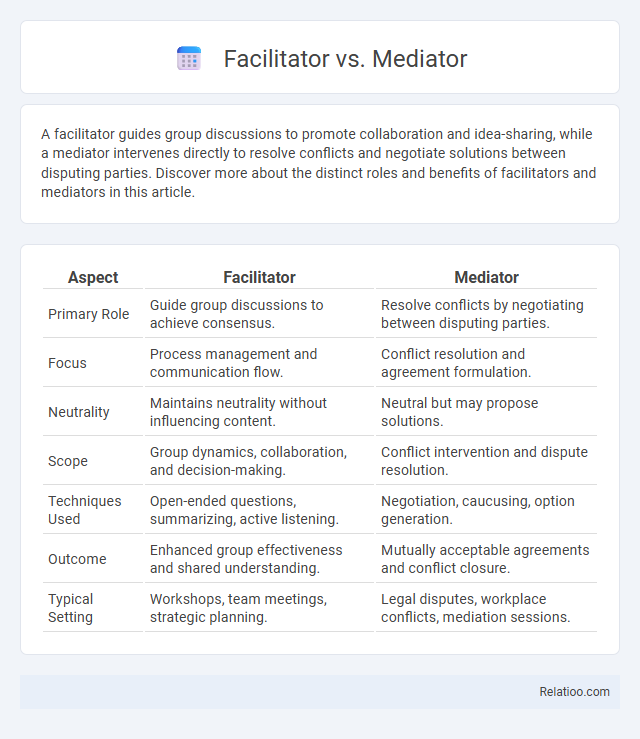A facilitator guides group discussions to promote collaboration and idea-sharing, while a mediator intervenes directly to resolve conflicts and negotiate solutions between disputing parties. Discover more about the distinct roles and benefits of facilitators and mediators in this article.
Table of Comparison
| Aspect | Facilitator | Mediator |
|---|---|---|
| Primary Role | Guide group discussions to achieve consensus. | Resolve conflicts by negotiating between disputing parties. |
| Focus | Process management and communication flow. | Conflict resolution and agreement formulation. |
| Neutrality | Maintains neutrality without influencing content. | Neutral but may propose solutions. |
| Scope | Group dynamics, collaboration, and decision-making. | Conflict intervention and dispute resolution. |
| Techniques Used | Open-ended questions, summarizing, active listening. | Negotiation, caucusing, option generation. |
| Outcome | Enhanced group effectiveness and shared understanding. | Mutually acceptable agreements and conflict closure. |
| Typical Setting | Workshops, team meetings, strategic planning. | Legal disputes, workplace conflicts, mediation sessions. |
Introduction to Facilitators and Mediators
Facilitators guide group discussions and processes to enhance communication and collaboration, ensuring that Your team stays focused and productive. Mediators specialize in resolving conflicts between parties by fostering mutual understanding and negotiating agreements without taking sides. Both roles play crucial parts in improving interactions, but facilitators emphasize process management while mediators focus on conflict resolution.
Defining the Roles: Facilitator vs Mediator
A facilitator guides group discussions and decision-making processes to ensure effective communication and collaboration, while a mediator intervenes in conflicts to resolve disputes and find mutually acceptable solutions. Your choice between a facilitator or mediator depends on whether the goal is to enhance group dynamics or to address and settle specific conflicts. Understanding these distinct roles helps optimize team interactions and conflict resolution strategies.
Core Responsibilities of a Facilitator
A facilitator guides group processes by creating a neutral environment that encourages open dialogue, clarifies objectives, and ensures balanced participation without imposing decisions. Unlike mediators who resolve conflicts by negotiating agreements between disputing parties, facilitators focus on enabling collaboration and consensus-building among team members. Core responsibilities of a facilitator include managing group dynamics, fostering clear communication, and steering discussions toward productive outcomes.
Primary Duties of a Mediator
The primary duties of a mediator focus on assisting disputing parties in reaching a mutually acceptable agreement through impartial guidance and effective communication techniques. Mediators facilitate dialogue, identify underlying interests, and help clarify misunderstandings without imposing decisions or outcomes. Unlike facilitators who primarily guide group processes or trainers who impart knowledge, mediators specialize in conflict resolution by fostering trust and encouraging collaborative problem-solving.
Key Differences Between Facilitation and Mediation
Facilitation focuses on guiding group discussions to enhance collaboration and decision-making, whereas mediation involves resolving conflicts between parties by finding mutually acceptable solutions. Facilitators remain neutral process managers, encouraging participation without imposing outcomes, while mediators actively intervene to negotiate agreements and manage emotional dynamics. The key difference lies in facilitation fostering communication for collective goals, while mediation addresses and resolves specific disputes.
Skills Required: Facilitator vs Mediator
Facilitators require strong communication, active listening, and group management skills to guide discussions and ensure balanced participation. Mediators need conflict resolution expertise, emotional intelligence, and neutrality to help disputing parties reach mutually acceptable agreements. Your choice between a facilitator and mediator should depend on whether the focus is on collaborative dialogue or conflict resolution.
When to Choose a Facilitator
Choose a facilitator when the goal is to guide a group discussion, coordinate collaboration, or drive consensus without imposing decisions, especially in team meetings, workshops, or strategic planning sessions. Facilitators excel at managing group dynamics, ensuring balanced participation, and keeping conversations focused and productive. Unlike mediators, who intervene in conflicts to resolve disputes, facilitators support process flow and idea generation in neutral, non-adversarial settings.
When to Opt for a Mediator
When conflicts involve emotionally charged parties or legal complexities, opting for a mediator ensures a neutral environment where you can safely explore mutually acceptable solutions. Mediators are specially trained to handle disputes that require confidentiality and impartiality, making them ideal for resolving contract disagreements or family disputes. Your choice should consider the intensity of the conflict and the need for professional guidance beyond facilitation techniques.
Advantages and Limitations of Each Role
Facilitators enhance group collaboration by guiding discussions and ensuring equal participation, promoting creativity but may lack authority to resolve conflicts decisively. Mediators specialize in conflict resolution, providing neutrality and helping parties reach mutually agreeable solutions, though their role is limited when parties are unwilling to negotiate. Arbitrators hold decision-making power to impose binding outcomes, offering finality but often sacrificing collaborative problem-solving and participant satisfaction.
Conclusion: Selecting the Right Approach for Conflict Resolution
Choosing between a facilitator, mediator, and arbitrator depends on the nature and complexity of the conflict, as well as the desired outcome. Facilitators guide open communication and collaboration without imposing decisions, ideal for group discussions and consensus-building, whereas mediators actively help conflicting parties reach a voluntary agreement through negotiation techniques. Arbitrators provide binding resolutions by evaluating evidence and making decisions when parties require an authoritative and final judgment.

Infographic: Facilitator vs Mediator
 relatioo.com
relatioo.com